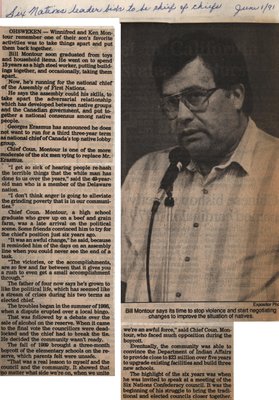"Six Nations Leader Bids to be Chief of Chiefs"
- Full Text
- Six Nations leader bids to be chief of chiefs
OHSWEKEN - Winnifred and Ken Montour remember one of their son's favorite activities was to take things apart and put them back together.
Bill Montour soon graduated from toys and household items. He went on to spend 15 years as a high steel worker, putting buildings together, and occasionally, taking them apart.
Now, he's running for the national chief of the Assembly of First Nations.
He says the assembly could his skills, to take apart the adversarial relationship which has developed between native groups and the Canadian government, and put together a national consensus among native people.
Georges Erasmus has announced he does not want to run for a third three-year term as national chief of Canada's top native lobby group.
Chief Coun. Montour is one of the more moderate of the six men vying to replace Mr. Erasmus.
"I get so sick of hearing people re-hash the terrible things that the white man has done to us over the years," said the 49-year-old man who is a member of the Delaware nation.
"I don't think anger is going to alleviate the grinding poverty that is in our communities."
Chief Coun. Montour, a high school graduate who grew up on a beef and grain farm, was a late arrival on the political scene. Some friends convinced him to try for the chief's position just six years ago.
"It was an awful change," he said, because it reminded him of the days on an assembly line when you could never see the end of a task.
"The victories, or the accomplishments, are so few and far between that it gives you a rush to even get a small accomplishment through."
The father of four now says he's grown to like the political life, which has seemed like a stream of crises during his two terms as elected chief.
The troubles began in the summer of 1986, when a dispute erupted over a local bingo.
That was followed by a debate over the sale of alcohol on the reserve. When it came to the final vote the councillors were dead-locked and the chief had to break the tie. He decided the community wasn't ready.
The fall of 1989 brought a three-month boycott of the elementary schools on the reserve, which parents felt were unsafe.
"That was a real lesson to myself and the council and the community. It showed that no matter what side we're on, when we unite we're an awful force," said Chief Coun. Montour, who faced much opposition during the boycott.
Eventually, the community was able to convince the Department of Indian Affairs to provide close to $23 million over five years to upgrade existing facilities and build three new schools.
The highlight of the six years was when he was invited to speak at a meeting of the Six Nations Confederacy council. It was the beginning of his struggle to bring the traditional and elected councils closer together.
- Media Type
- Newspaper
- Item Types
- Articles
- Clippings
- Description
- "Bill Montour soon graduated from toys and household items. He spent 15 years as a high steel worker, putting buildings together, and occasionally, taking them apart. Now he's running for the national chief of the Assembly of First Nations."
- Date of Publication
- 1 Jun 1991
- Subject(s)
- Personal Name(s)
- Montour, Winnifred ; Montour, Kenneth ; Montour, Bill ; Erasmus, Georges.
- Corporate Name(s)
- Department of Indian Affairs ; Haudenosaunee Confederacy Chiefs Council ; Six Nations Elected Band Council.
- Local identifier
- SNPL002978v00d
- Collection
- Scrapbook #3
- Language of Item
- English
- Creative Commons licence
 [more details]
[more details]- Copyright Statement
- Public domain: Copyright has expired according to Canadian law. No restrictions on use.
- Copyright Date
- 1991
- Contact
- Six Nations Public LibraryEmail:info@snpl.ca
Website:
Agency street/mail address:1679 Chiefswood Rd
PO Box 149
Ohsweken, ON N0A 1M0
519-445-2954



